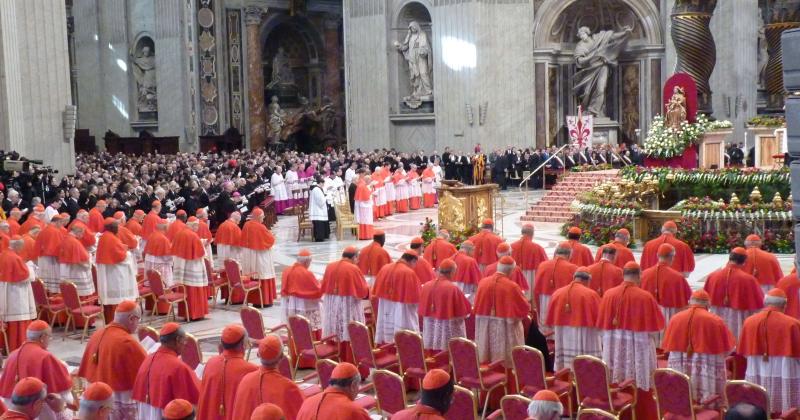The new consistory announced by Pope Francis continues the policy of including bishops from mission territories in the Church within the College of Cardinals
It will not take place in November, for the Feast of Christ the King. Instead, the Consistory for the Creation of New Cardinals has been moved forward to Saturday, 5 October, the day before the opening of the Synod of Bishops dedicated to the Amazon. Thus, taking us by surprise, the Pope announced during the Angelus of Sunday, 1 September, the list of 13 new cardinals who will receive the red hat, eight of whom belong to missionary religious congregations.
Skimming the list of the new cardinals, Pope Francis’ steadfastness to the path he has undertaken from the beginning of his pontificate was evident right away, (ten are under eighty years of age and, therefore, are electors in case of a conclave, plus three who are over eighty, and, therefore, are not electors): that of preferring Church men in missionary dioceses beyond the reach of established patterns or traditions.
Three prelates of the Roman Curia will receive the red-colored berretta, a symbol of their willingness to spill their blood and, therefore, to donate their very lives in fidelity to the Gospel in union with the Bishop of Rome: the President of the Pontifical Council for Interreligious Dialogue, Miguel Angel Ayuso Guixot, a Combonian Missionary from Spain who was nominated this past May to guide this Dicastery, and is therefore on the front lines in the dialogue with Islam and other religions; José Tolentino Calaça de Mendonça from Portugal who, for little more than a year, has been Archivist and Librarian of the Holy Roman Church; Father Michael Czerny, a Jesuit from the former Czechoslovakia and trained in Canada and the United States who is the Undersecretary of the Migrants and Refugees Section of the Dicastery for Promoting Integral Human Development. Of the curial nominations, the latter is certainly the most innovative. Czerny, in addition to his work for migrants and refugees will have a key role as special secretary for the upcoming Synod for the Pan-Amazon region.
Of the ten new cardinal electors, two are diocesan bishops in Europe: Jesuit Jean-Claude Höllerich from Luxembourg who spent several years of his life in Japan, and the Italian, Matteo Zuppi. Two are Latin American: Juan de la Caridad García Rodríguez from Cuba, and Alvaro Leonel Ramazzini Imeri from Guatemala. Two are bishops in Africa: Capuchin Fridolin Ambongo Besungu, Archbishop of Kinshasa in the Democratic Republic of the Congo, and Salesian Cristóbal López Romero, originally from Spain and currently Archbishop of Rabat, in Morocco. Lastly, Ignatius Suharyo Hardjoatmodjo of Asian origin, is the Archbishop of Jakarta, in Indonesia.
Even the three new cardinals over eighty whom Pope Francis wanted to include in the College of Cardinals confirm the perspective of the pontificate: British-born Archbishop Michael Louis Fitzgerald, a White Father, who was dedicated for many years to interreligious dialogue and who in his last years served in the Apostolic Nunciature in Egypt; Jesuit Sigitas Tamkevičius, Archbishop Emeritus of Kaunas in Lithuania; and Eugenio Dal Corso of the Poor Servants of Divine Providence, born in the Italian province of Verona, Bishop Emeritos of Benguela in Angola.
The Consistory of 5 October 2019 will be the sixth consistory for the creation of new Cardinals presided over by Pope Francis. The preceding ones were held on 22 February 2014, 14 February 2015, 19 November 2016, 28 June 2017 and 28 June 2018.
